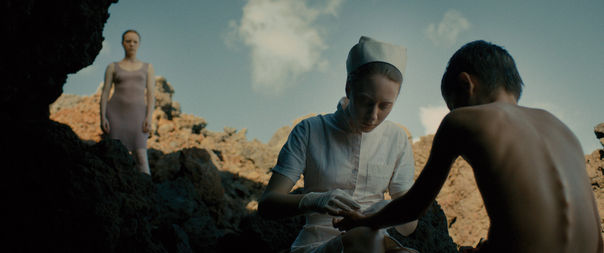Review: Evolution
written by Emre Çağlayan

Evolution
What is at stake in certain films is less a comprehensible story involving a motivated character, an event, or an obstacle. These films can best be described as creating an imaginary and unique world, and, immersing oneself in it, makes the prospects of contemplating and reflecting upon the most pressing concerns of the human experience possible. Lucile Hadžihalilović's EVOLUTION / ÉVOLUTION (2015) is an example to this esoteric strand of filmmaking – uncompromising in its vision, it is a challenging journey based on the director's memories of childhood and confronting a multitude of negative emotions: anxiety of growing up, fear of pregnancy, and trepidation of death.
The film takes place on a remote volcanic island, where Nicolas is coming of age and is teased by other boys in an otherwise uninhabited village, with the exception of his and the other boys’ mother(s), who seem to be primarily interested in curing their children from an inexplicable disease at a run-down hospital. The barren landscape, however, speaks more than these disturbingly laconic characters, as the film frequently portrays waves crashing on beaches composed of black volcanic pebbles, with an even more extensive portrayal of underwater sea creatures. Most significant and vivid of all is a red starfish, in itself a potent evocation of the mystery that surrounds the cycle of life – birth, death, and all in between.
Indeed, the film’s iconography is as ambiguous as its conception of time and space, where the advancement of medical technology contradicts the primitive and elusive rituals enacted by the nurses. Another mesmerizing scene depicts a flowing mass of green algae with minutes on end – an extended moment that renders the impression of living inside an aquarium through the movement of water dust in harmony to eerie drone music. Although the filmmaker and the cinematographer wanted to achieve a grainy image, shooting in celluloid was not feasible, so they reconstructed film grain in digital post-production – an aesthetic practice that appears as a bemusing parallel to Instagram filters mimicking 8mm color palettes.
If Hadžihalilović's equally cryptic feature-length debut INNOCENCE (2004) was a parable on the ways in which young girls are conditioned by society through education and discipline, then EVOLUTION might be seen as an unsettling tale about a boy's rite of passage, a realization of one’s own aging body and the angst of puberty. But on a metaphorical dimension, EVOLUTION seems less interested in the politics of gender and questions instead the cosmic, existential, or even ecological state of affairs. It explores what we are as humans, where we come from, and where we are headed, and especially how this trajectory relates to this small blue planet. In this world, a seashell can be a gift, a piece of memorabilia for the children, yet another symbol of the enigmatic transition they are about to experience. This, and the film’s unwavering investment in nature, seems to suggest a paradox of evolution – the possibility of a future devolution to our origins, to a more primordial form of existence, with, or without, the burden of consciousness.

